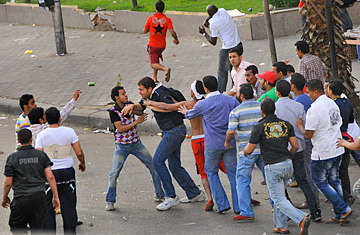
Christians and Muslims clash in Cairo, Egypt, May 8, 2011.
19-year-old Rojeh Reda says he hasn't slept much the past five days. Cairo University literature student and Shakespeare buff says he and his two friends have made it their mission to patrol and monitor the streets of his neighborhood, Imbaba, a poor working-class district in Cairo.
Over the weekend, fighting in Imbaba between hundreds of Muslims and Christians left at least 12 people dead, more than 200 wounded and two churches in flames, in the latest outbreak of sectarian violence since President Hosni Mubarak was ousted in February. Reda stops at the Church of the Virgin Mary, most of its interior still covered in soot, and leafs through a charred hymnal. "Yes, we say Muslims and Christians are one hand," says Reda, a Coptic Christian, citing a common chant from Egypt's democratic uprisings. "But there are big problems here and no one likes talking about them until this happens." Copts, a Christian sect who consider themselves indigenous Egyptians (in their language, copt literally means "people of Egypt") make up roughly 10 percent of the majority Sunni Muslim country.
While several often-conflicting details have emerged from the weekend's clashes, the flashpoint appears to have been a rumor that a recent Christian convert to Islam was being held against her will in a church in Imbaba, setting off hours of fighting in the streets. Many witnesses blamed Egypt's Salafis — adherents of a narrow, intolerant interpretation of Islam shared by many adherents of the al-Qaeda world view — for stoking tensions. Largely suppressed under Mubarak's rule, the Salafist brand of medieval Islam has found space to reassert itself in Egypt's fledgling democracy. Some analysts see the Salafists as political allies of the more moderate Muslim Brotherhood, the most powerful political group in Egypt, but many in the Brotherhood see them as a threat. (Several Salafi sheiks condemned the sectarian attacks on Sunday and denied their involvement, as did the Muslim Brotherhood.)
With the world's eyes on Egypt as it attempts a precarious transition to democracy, the latest outbreak of religious strife comes at a critical moment. "This is the worst thing that could happen to Egypt right now: for the Coptic community to feel they were better off, that society was more stable, under Mubarak," says Hossam Bahgat, founder of Egyptian Initiative for Personal Rights, which monitors sectarian violence. Many Copts were initially reluctant to participate in Egypt's uprising, fearing marginalization in an increasingly Islamized society. (Just how safe Copts were under Mubarak is open to question, of course, given the sectarian violence and widespread suspicion of Christians that his regime had stoked as a hedge against challenges to its rule.) "We had Mubarak, and no, he wasn't great — but at least we were safe," reflects Reda. "And now look at this. Where was the army? The police? The revolution, she killed us."
Egypt's governing military council quickly announced trials for 190 people arrested in the violence. But a crowd of thousands, including both Copts and Muslims, gathered in protest on Sunday and Monday outside the state television building, haranguing the military government for not preventing the violence and calling for the resignation of the military leader, Field Marshal Mohamed Hussain Tantawi.
